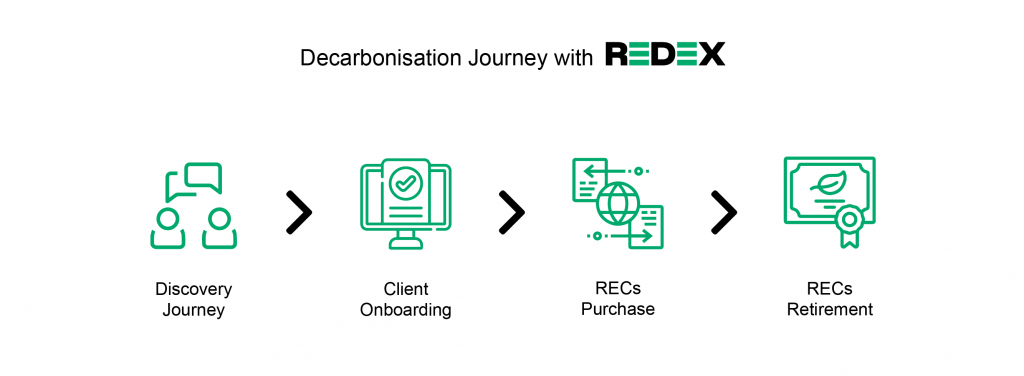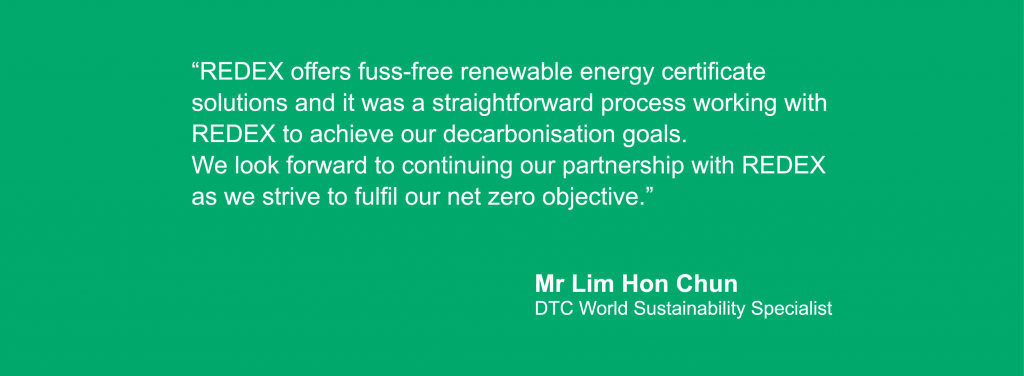
A renewable energy certificate (REC) traces the consumption of one megawatt-hour (MWh) of electricity to a renewable energy source. This tracking attribute enables organisations to utilise RECs as a tool to prove that they have used renewable energy and reduced their Scope 2 emissions.
In this blog post, we find out more about how a Singaporean Small and Medium Enterprise (SME) achieved its decarbonisation goals using RECs.
A Sustainability Journey
DTC World Corporation is a premiums and point-of-sale merchandise solution and global fulfilment company. It began its sustainability journey in 2016 when one of its key customers, Nestle, requested the company to undertake an EcoVadis business sustainability assessment in order to be part of their approved supplier network.
Around the same time, DTC World started noticing a new trend where MNCs sought to adopt and implement sustainability sourcing requirement in their supply chains. Recognising the urgency to take action that mitigates climate change, DTC decided to embrace sustainability.
Beyond resolving environmental concerns, DTC World would also reap the business benefits of adopting sustainability into its operations. The company achieved a Gold medal credential from Ecovadis in 2018, paving the way for it to earn a Tiger Global Fulfilment Partner vendor contract with Heineken that same year. This further opened doors to many overseas markets and business opportunities. In 2019, the company’s export business rose by 84% in 2019 and business revenue increased by 46%, with the company becoming the preferred partner for more global MNCs.
Amongst DTC World’s sustainability goals, decarbonisation is a priority. The company hopes to achieve carbon neutrality for Scope 1 & 2 GHG emissions by 2030 and seeks to work with its value chain to reduce Scope 3 GHG emissions.
Reducing Scope 2 Emissions with RECs
However, DTC World faced challenges to reduce its emissions, especially for Scope 2. The business was unable to generate electricity from distributable energy devices such as solar panels as it does not own any buildings. It was also not economically feasible for DTC World to purchase renewable energy via power purchase agreements or green tariffs. The only viable option to reduce Scope 2 emissions was using renewable energy certificates.
With operations in Singapore, Malaysia, China and Vietnam, it was also a challenge to procure RECs for four different markets. DTC World had to seek a partner who could help reduce its carbon footprint across different jurisdictions. Through the UOB Finlab Sustainability Series, DTC World learnt about REDEX’s convenient renewable energy certificate solutions.
REDEX understands the pain points experienced by REC market participants including generators, issuers, buyers and sellers. It offers a one-stop ecosystem for RECs, enabling companies to purchase RECs at competitive prices and retire them with ease. Operating Asia’s leading trading platform for RECs, REDEX helped DTC World to source and retire high-quality RECs in each of the four markets the latter operated in.

DTC World Sustainability Specialist Mr Lim Hon Chun says: “REDEX offers fuss-free renewable energy certificate solutions and it was a straightforward process working with
REDEX to achieve our decarbonisation goals. We look forward to continuing our partnership with REDEX as we strive to fulfil our net zero objective.”
“As a simple tool that is easily scalable and implemented, I highly recommend using renewable energy certificates as a viable decarbonisation solution for other companies. RECs are a convenient solution, especially for SMEs, in our sustainability journey.”

With REC solutions tailored to meet the needs of SMEs, REDEX helped DTC World to successfully reduce its carbon footprint. Click here to find out more about how REDEX can help your company achieve net zero!

